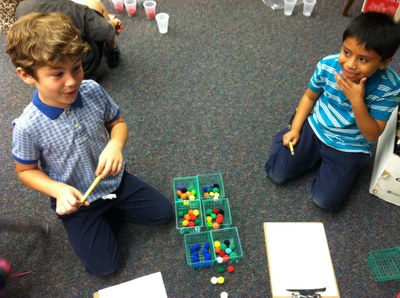Cotsen Fellowship in Mathematics
Cotsen Fellowship Overview
The Cotsen Foundation develops artful teaching. As a Cotsen Fellow I chose to focus developing my craft as a teacher in the area of mathematics. Cotsen supports teachers through thoughtful professional development that focuses on developing strong teachers that actively engage students. The Cotsen Fellowship is a two year commitment.
My Role as a Cotsen Math Fellow
As a Cotsen Math Fellow, every week I plan a math lesson, am observed teaching mathematics by my math mentor, and then debrief and plan next steps. My mentor and I focus on the goals, that I picked at the beginning of the year, to focus on developing my craft as a teacher. As a fellow, every week I reflect on my mathematics lessons and my teaching goals. Every month, all fellows and our mentor meet for an inquiry meeting to research successful teaching strategies in mathematics and discuss progress on our teaching goals.

Every other month, Cotsen provides professional development opportunities for fellows. All professional development sessions are based on what fellows want to learn. Training sessions were lead by experts in the field of children’s mathematics. This year the Costen Fellows at my school site, have been focusing on Cognitively Guided Instruction (CGI). We have had four professional development sessions with Angela Chan and we also saw Dr. Megan Franke speak about CGI at a mathematics convention. I have also learned about number talks and the importance of mathematical reasoning and critical thinking in the development of number sense.
The Cotsen Fellows at my school site, Linwood E. Howe, decided that we wanted to impact mathematics instruction beyond our classrooms. We thought about how great it would be if other teachers at our school and in Culver City Unified started teaching mathematics using CGI. Cotsen supported our idea by hiring Angela Chan to watch our CGI lessons, debrief with us, and then help us develop even better CGI lessons. This helped prepare us for opening up our doors for our first CGI Day. All the schools in Culver City Unified were invited to watch us teach a CGI mathematics lesson. Our CGI Day was held on Tuesday, April 29, from 9:00-3:30. CGI Day was a great opportunity for us to share the positive impact that teaching with CGI has made in our classrooms. It was also a great way to motivate the teachers that attended to learn more about and try CGI in their own classrooms with their students.
 Reflection
Reflection
Through my experience as a Cotsen Fellow, I have learned that one of the most effective ways to get teachers to try teaching mathematics using CGI, was to invite them into my classroom to see, first hand, the positive impact CGI has on student learning. When teachers saw the positive impact that CGI had on students’ mathematical understanding, most of them immediately wanted to go back to their own classroom and try to use CGI to teach a mathematics lesson. I also learned that implementing one amazing teaching strategy in my classroom was not enough. To expand on my teaching of mathematics in a student centered way, I started giving number talks in my classroom, implemented a Math Wall, and started Math Workshop time. The blend of CGI and number talks, Math Wall and Math Workshop really helped my students understand key mathematical concepts and learn how to think critically.
CPSEL Connection
STANDARD 1: A SCHOOL ADMINISTRATOR IS AN EDUCATIONAL LEADER WHO PROMOTES THE SUCCESS OF ALL STUDENTS BY FACILITATING THE DEVELOPMENT, ARTICULATION, IMPLEMENTATION, AND STEWARDSHIP OF A VISION OF LEARNING THAT IS SHARED AND SUPPORTED BY THE SCHOOL COMMUNITY.
1.1 Facilitate the development of a shared vision for the achievement of all students based upon data from multiple measures of student learning and relevant qualitative indicators.
1.5 Shape school programs, plans, and activities to ensure that they are integrated, articulated through the grades, and consistent with the vision.
1.6 Leverage and marshal sufficient resources, including technology, to implement and attain the vision for all students and all subgroups of students.
STANDARD 2: ADVOCATING, NUTURING, AND SUSTAINING A SCHOOL CULTURE AND INSTRUCTIONAL PROGRAM CONDUCTIVE TO STUDENT LEARNING AND STAFF PROFESSIONAL GROWTH
2.1 Shape a culture in which high expectations are the norm for each student as evident in rigorous academic work.
2.2 Promote equity, fairness, and respect among all members of the school community.
2.3 Facilitate the use of a variety of appropriate content-based learning materials and learning strategies that recognize students as active learners, value reflection and inquiry, emphasize the quality versus the amount of student application and performance, and utilize appropriate and effective technology.
2.4 Guide and support the long-term professional development of all staff consistent with the ongoing effort to improve the learning of all students relative to the content standards.
2.5 Provide opportunities for all members of the school community to develop and use skills in collaboration, distributed leadership, and shared responsibility.
2.6 Create an accountability system grounded in standards-based teaching and learning.
2.7 Utilize multiple assessments to evaluate student learning in an ongoing process focused on improving the academic performance of each student.
STANDARD 3: ENSURING MANAGEMENT OF THE ORGANIZATION, OPERATIONS, AND RESOURCES FOR A SAFE, EFFICIENT, AND EFFECTIVE LEARNING ENVIRONMENT.
3.3 Establish school structures and processes that support student learning.
3.4 Utilize effective systems management, organizational development, and problem-solving and decision-making techniques.
3.5 Align fiscal, human, and material resources to support the learning of all subgroups of students.
STANDARD 6: A SCHOOL ADMINISTRATOR IS AN EDUCATIONAL LEADER WHO PROMOTES THE SUCCESS OF ALL STUDENTS BY UNDERSTANDING, RESPONDING TO, AND INFLUENCING THE LARGER POLITICAL, SOCIAL, ECONOMIC, LEGAL, AND CULTURAL CONTEXT.
6.6 View oneself as a leader of a team and also as a member of a larger team.
6.7 Open the school to the public and welcome and facilitate constructive conversations about how to improve student learning and achievement.



